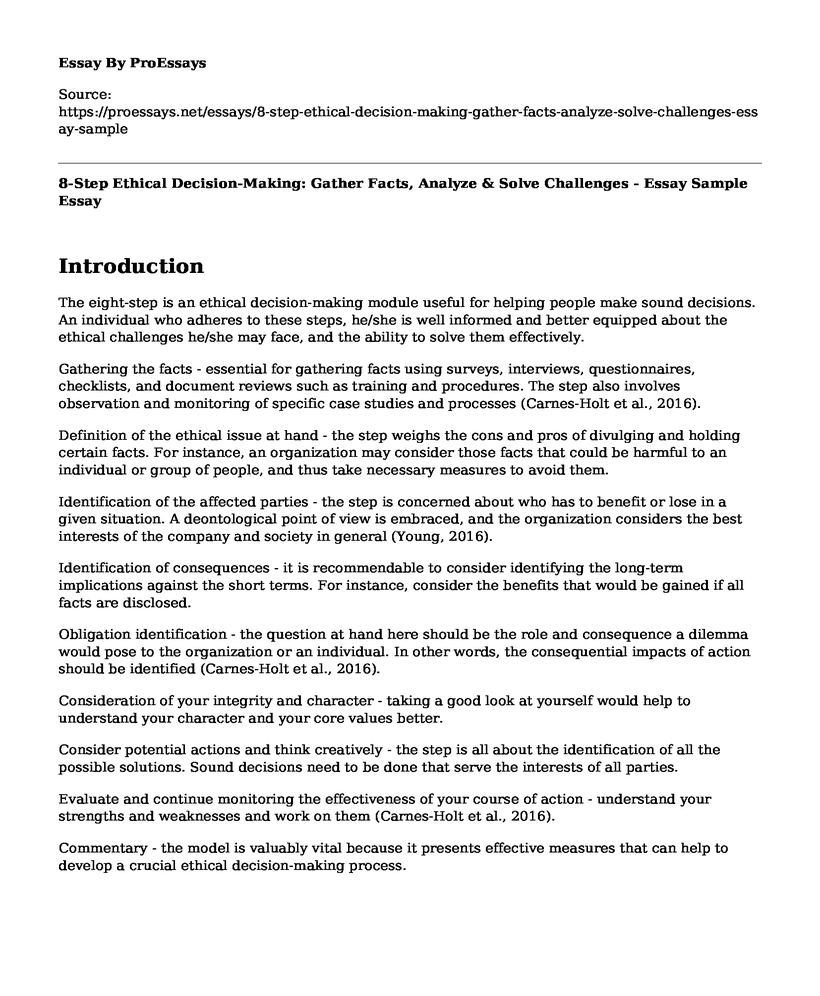Introduction
The eight-step is an ethical decision-making module useful for helping people make sound decisions. An individual who adheres to these steps, he/she is well informed and better equipped about the ethical challenges he/she may face, and the ability to solve them effectively.
Gathering the facts - essential for gathering facts using surveys, interviews, questionnaires, checklists, and document reviews such as training and procedures. The step also involves observation and monitoring of specific case studies and processes (Carnes-Holt et al., 2016).
Definition of the ethical issue at hand - the step weighs the cons and pros of divulging and holding certain facts. For instance, an organization may consider those facts that could be harmful to an individual or group of people, and thus take necessary measures to avoid them.
Identification of the affected parties - the step is concerned about who has to benefit or lose in a given situation. A deontological point of view is embraced, and the organization considers the best interests of the company and society in general (Young, 2016).
Identification of consequences - it is recommendable to consider identifying the long-term implications against the short terms. For instance, consider the benefits that would be gained if all facts are disclosed.
Obligation identification - the question at hand here should be the role and consequence a dilemma would pose to the organization or an individual. In other words, the consequential impacts of action should be identified (Carnes-Holt et al., 2016).
Consideration of your integrity and character - taking a good look at yourself would help to understand your character and your core values better.
Consider potential actions and think creatively - the step is all about the identification of all the possible solutions. Sound decisions need to be done that serve the interests of all parties.
Evaluate and continue monitoring the effectiveness of your course of action - understand your strengths and weaknesses and work on them (Carnes-Holt et al., 2016).
Commentary - the model is valuably vital because it presents effective measures that can help to develop a crucial ethical decision-making process.
My Understanding of the Supported and Unsupported Model of the Ethical Decision-Making Process
The supported model is that which is backed by research or scholarly outlined principle of ethics. The unsupported model can be developed by an individual to guide their lives but not of a professional body. For instance, the eight-step model process is considered to be a supported model because it explores the APA's code of ethics.
References
Carnes-Holt, K., Maddox, I. I., Paul, R., Warren, J., Morgan, M., & Zakaria, N. S. (2016). Using bookmarks: An approach to support ethical decision making in play therapy. International Journal of Play Therapy, 25(4), 176.
Young, G. (2017). Ethical decision making: Fallacies/biases and models. In Revising the APA ethics code (pp. 213-244). Springer, Cham.
Cite this page
8-Step Ethical Decision-Making: Gather Facts, Analyze & Solve Challenges - Essay Sample. (2023, Apr 12). Retrieved from https://proessays.net/essays/8-step-ethical-decision-making-gather-facts-analyze-solve-challenges-essay-sample
If you are the original author of this essay and no longer wish to have it published on the ProEssays website, please click below to request its removal:
- Paper Example on Modern Rangers: Ethics and Leadership
- Job Overview of Global Project Manager Paper Example
- The Leadership Style in Miami Heat Organization Paper Example
- Forensic Readiness: Protecting Digital Evidence & Securing Company Data - Essay Sample
- Essay Example on Competing Theories of Decision-Making: Plato vs Sun Tzu
- Essay Sample on Crisis Management: Avoiding Risk & Communication Breakdown
- Paper Example on Growth of Businesses: Strategies to Achieve Successful Outcomes







